ECA stands for Educational Credential Assessment, which is required by individuals who have studied outside of Canada and are applying for immigration, work, or further education in Canada. It’s a process where your foreign educational credentials are evaluated to ensure they meet Canadian standards.
This assessment is usually done by designated organizations approved by Immigration, Refugees and Citizenship Canada (IRCC). The ECA evaluates your educational credentials to confirm their equivalence to Canadian standards. This assessment is a crucial step in many Canadian immigration and educational processes, helping authorities understand the value of your foreign education in Canadian terms.
Each designated organization may have its own specific criteria for evaluation, so it’s essential to choose the right organization based on your circumstances and the purpose of your evaluation.
The ECA evaluates your foreign educational credentials to ensure they are equivalent to a Canadian degree, diploma, or certificate. This assessment is conducted by designated organizations approved by Immigration, Refugees and Citizenship Canada (IRCC).
To apply for an ECA for Canada, follow these general steps:
Choose a Designated Organization: IRCC has a list of approved organizations that conduct ECAs. You’ll need to select one of these organizations.
Gather Required Documents: Typically, you’ll need to provide your academic transcripts, degree certificates, and any other relevant documents. Check the specific requirements of the organization you choose.
Submit Application: Fill out the application form provided by the chosen organization and submit it along with the required documents. There is usually a fee for the assessment.
Wait for Assessment: The organization will evaluate your credentials and provide a report stating the Canadian equivalent of your education.
Use the ECA Report: Once you receive the ECA report, include it in your application for Canadian immigration, work permits, or educational programs as required by the authorities.
Designated organizations to perform Education Credential Assessment
You must use one of these designated organizations for evaluating your education credentials.
- Comparative Education Service – University of Toronto School of Continuing Studies
- International Credential Assessment Service of Canada
- World Education Services
- International Qualifications Assessment Service (IQAS)
- International Credential Evaluation Service
If you are planning to migrate to Canada or need guidance in performing your Education Credential Assessment, then CanApprove will be your trusted partner. We are providing immigration service for more than 25 years since 1998 and have given wings to the immigration dreams of 1000s of aspirants who flew to Canada, Australia and other countries for settlement and overseas education.
What we offer at CanApprove?
- Free Assessment
- Pre-Screening
- Documentation Process
- Review Rejections & Appeal Guidance
- Training for Interviews
- Post-landing Services
Why should you choose us?
🎖️25+ years of exceptional service
🧑🏻🏫Governed by veteran immigration attorneys
⭐1000s of success stories
🍁CICC Registered
🏢Headquartered in Canada
Wrapping up…
Made your mind up? Then what are you waiting for? Our immigration coordinator is just a click away. Connect now and kick off your Canada immigration process right away. You will have the industry best immigration assistance that will be worth all the efforts that you took!
Thanks for reading! 😊



